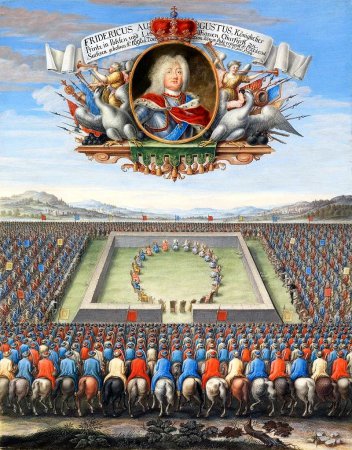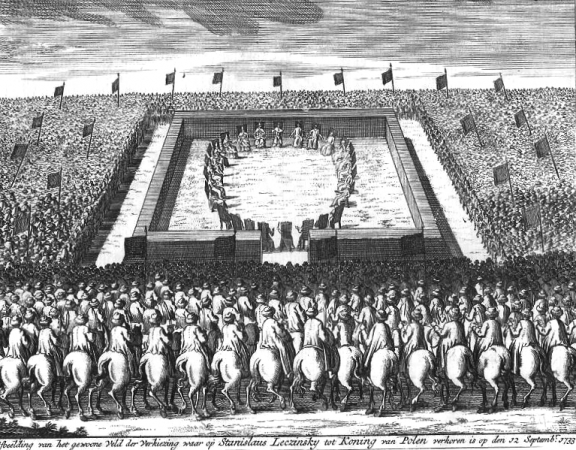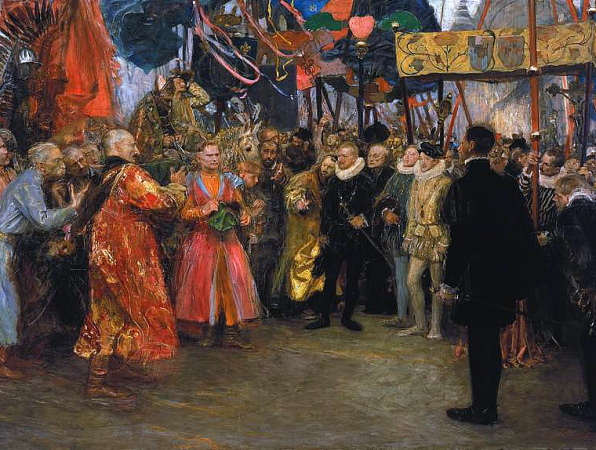Election Sejm
The Election Sejm was another type of the Sejm which was held during an interregnum. It was originally convened to elect the monarch, which was its primary task. The basis for establishment of election Sejms was the adoption of the election system of monarchs in Poland in the 15th century. King Władysław Jagiełło acknowledged the right to elect the ruler in the privileges granted in 1425-1433 in an attempt to secure the throne for his sons Władysław (b. 1424) and Kazimierz (b. 1427). After the death of king Władysław in 1434, a general Sejm convened, at which the dignitaries, who were members of the royal council, deputies from the lands belonging to the Kingdom, as well as numerous nobles and representatives of towns came together. The Sejm elected the minor king Władysław, confirmed the commitments made to his father, and ushered the election into political practice of the state. Elections repeated in the years 1445-1446, when election Sejms convened four times on similar principles as in 1434. Three of them took place in Piotrków in connection with the need to elect a monarch after the death of king Władysław III in the battle of Varna (1444). The assemblies elected king Casimir, brother of the fallen Wladyslaw and the Grand Duke of Lithuania, who delayed his consent to accept the throne (for this reason, Bolesław, a Mazovian prince, was elected in 1446, but eventually withdrew after Casimir accepted the election on 17 September 1446). In 1492, an election Sejm convened after the death of king Casimir Jagiellon. The election of king Jan Olbracht (27 August 1492) undoubtedly occurred with strong pressure from the nobility, who came to the election convention. The next election sessions were held in 1501, when the son of Casimir Jagiellon and brother of the late Jan Olbracht, Alexander (3 October 1501), the Grand Duke of Lithuania, was elected king, and in 1506 when the brother of the previous rulers, the Grand Duke of Lithuania, Sigismund (7 December 1506), was elected. In all these cases, the election was made by the royal council and then the senate, in a closed session. After reaching unanimity in the vote, the grand marshal of the crown proclaimed the election to the assembled nobility, which, by acclamation, confirmed that it had been made. From 1501, when electing the king, the customary norms written on the basis of the 1492 election practice, called the Modus elgendi regis, were in force. The viritim participation of nobility in those assemblies was important as they came in person, exercising their influence on the choice. The senate asked the nobility several times about their opinion on the candidate. Representatives of the nobility of individual lands, representing all the nobility, signed the act of election, making it binding.
The election principle was violated upon the initiative of the royal court in October 1529 at the Sejm in Piotrków, when King Sigismund Augustus was elected successor of Sigismund I. He was subsequently crowned on 18 December 1529. Due to the turmoil that occurred as a result of the election of the king’s underage son, which had been coerced upon the previous Sejm, king Sigismund issued two laws in 1530 and 1538, confirming the election as an institution of the political system of the state. In the laws, the king defined the principles on which election was to be held, especially with regard to granting the nobility the right to participate. Both laws emphasised the right to participate in the election for all entitled persons, i.e. the part of the nobility which, by virtue of possession of real estates, performed military duties and was able to arrive on the election grounds (unusquisque qui vellet).
However, due to the childless death of King Sigismund August (July 7, 1572) and ensuing interregnum which lasted until 1576, except for a short reign of King Henry, it was necessary to elect his successor. This triggered the process of organizing the interregnum period, during which new forms of the Sejm emerged: apart from the convocation Sejm, which was to make decisions concerning the organization of the interregnum and procedure of the election, the election Sejm proper for that period was also created. However, due to the circumstances present at the time, its role, function and purpose differed from those of the Sejm which elected the monarch in the Jagiellonian times. In the system of institutions of the interregnum period, the election Sejm gained special prominence, as its organisation became dominated by its primary task which was the election of the ruler. The election Sejm, with time called the "father of all Sejms", was also considered the most competent to make good all grudges and exorbitances. It was able to deal with any matter because of the viritim participation of all the entitled and of the possibility of establishing, upon the consent of the assembly, of mandatory norms which would enter into force during an interregnum. Also, no time constraints applied to the election Sejm.
It was assumed that the election Sejm, in spite of certain ficticious mechanisms enabling it to act, had the power to pass laws binding on the monarch, requiring royal sanctions, which should be obtained after their adoption and confirmation by the king, during the coronation Sejm at the latest. The validity of the law passed by the Sejm depended on its endorsement by the monarch. In addition, the function of the election Sejm during an interregnum was to represent the Polish Commonwealth in foreign countries. This meant receiving foreign envoys, sending missions and, above all, concluding an agreement with the candidate on the conditions to be agreed with the delegates, which the candidate was to pledge and keep in order for the coronation and assuming the power to take place. The Sejm exercised this function fully as a representation of the Polish Commonwealth. Another function of the Sejm, which appeared as early as in the first interregnum (1572-1574) and remained within the scope of its tasks, becoming more and more important with time, was the issue of making attempts to improve the political system of the Polish Commonwealth. Usually, an interregnum was an opportunity to raise issues needing improvement, in particular to demand rectification of errors from the predecessor's rule which were the source of exorbitance and gravamins, which made the latter the prerequisites for certain reforms in the system of the Commonwealth. Also, securing the rights in the form of adopting resolutions and rights which would then bind the candidate to the throne has become an important objective. These served to determine the programmes of the future reign, which was fully reflected in the Convention Pacts and other resolutions which were to become binding for the elect. These actions stressed the power of the Sejm as the supreme body during an interregnum, capable of passing effective laws and considering every issue concerning the principles of the political system, liberties of the nobility, relations between the state and religion, expression of political declarations, and even making corrections to the political system, as it did in 1632. Nonetheless, the main function and an important task of the Sejm during an interregnum was to conduct the election of the monarch. The preparation for the election, a duty of the Convocation Sejm which was responsible for determining the details of the organization of the election, led to the act of election which happened at the Election Sejm. One should distinguish between the activities of the Sejm and the very act of election, which constituted a separate activity in the legal sense and ended with the election of the monarch. That was one of the tasks of the Sejm as of the supreme authority of the Polish Commonwealth. Even though being a separate activity, the election was not only a choice of a person, but also a decision which was a state act. Despite these preparations, it was not uncommon that double elections took place, as an election of a candidate raised contention and election of another candidate was needed (1575, 1587, 1696, 1733). Between 1573 and 1764, 11 election sessions were held: 1573, 1575, 1587, 1632, 1648, 1669, 1674, 1696, 1704, 1733, 1764, when 11 rulers were elected and crowned. Until 1573, Piotrków was most often the place of election assemblies, and after 1573, Warsaw.
See: O. Balzer, Królestwo Polskie 1295 – 1370, vol. 1-3, Lwów 1919-1920; Adamus J., Geneza elekcyjności tronu polskiego, Sprawozdania Towarzystwa Naukowego Warszawskiego, Wydz. II, year book XXX/II, Warszawa 1937; W. Semkowicz, Stanowisko publiczno-prawne Władysława Jagiełły w Polsce, Przegląd prawa i administracji, 1899; A. Prochaska, Geneza i rozwój parlamentaryzmu za pierwszych Jagiellonów, Rozprawy Akademii Umiejętności, Wydział Historyczno-Filozoficzny, Ser. II, vol. 13, Kraków 1899, p. 1-184; S. Roman, Konflikt prawno-polityczny 1425-1430 r. a przywilej brzeski, „Czasopismo Prawno-Historyczne”, vol. 14, 1962, fas. 2, p. 63-92; A. Lewicki, Elekcja Kazimierza Jagiellończyka, Rozprawy Akademii Umiejętności, XX, 5; K. Stadnicki, O tronie elekcyjnym domu Jagiellonów w Polsce, Kraków 1880; vol. Silnicki, Prawo elekcyi królów w dobie jagiellońskiej, Lwów 1913; F. Bostel, Elekcja Aleksandra Jagiellończyka (1501), „Przewodnik naukowy i literacki”, 1887, p. 295-306, 338-352, 435-444, 512-528 ; F. Papée, Aleksander Jagiellończyk, Kraków 1949, p. 44-51; L. Kolankowski, Elekcya Zygmunta I. Kilka uwag o elekcyi w Polsce za Jagiellonów, Przewodnik Naukowy i Literacki, year book XXXIV, Lwów 1906, p. 865-875; L. Finkel, Elekcya Zygmunta I. Sprawy dynastyi Jagiellońskiej i unii polsko-litewskiej, Kraków 1910; O. Balzer, Modus eligendi regis z początku XVI wieku, in: Księga pamiątkowa ku uczczeniu 250-tej rocznicy założenia Uniwersytetu Lwowskiego przez króla Jana Kazimierza r. 1661, vol. 1, Lwów 1921, p. 3-21; W. Sobieski, Elekcja viritim, „Przewodnik naukowy i literacki”, year book 23, 1905, p. 539-560; J. Dzięgielewski, Sejmy elekcyjne. Elektorzy. Elekcje 1573-1674, Pułtusk 2003; W. Uruszczak, Ustawy Zygmunta I z lat 1530 i 1538 w sprawie elekcji królewskiej, in: Prawo wczoraj i dziś. Studia dedykowane profesor Katarzynie Sójce-Zielińskiej, edited by G. Bałtruszajtys, Warszawa 2000, p. 349-360; P. Skwarczyński, Pierwsze trzy wolne elekcje viritim 1573-1578. [Zagadnienia wybrane], Teki Historyczne, vol. 10, 1959, p. 119-154; S. Płaza, Próby reform ustrojowych w czasie pierwszego bezkrólewia [1572-1574], Kraków 1969; E. Dubas-Urwanowicz, Koronne zjazdy szlacheckie w dwóch pierwszych bezkrólewiach po śmierci Zygmunta Augusta, Białystok 1998; D. Makiłła, Artykuły henrykowskie (1573-1576). Geneza-Obowiązywanie-Stosowanie. Studium historyczno-prawne, Warszawa 2012; A. Pieńkowska, Zjazdy i sejmy z okresu bezkrólewia po śmierci Stefana Batorego, Pułtusk 2010; W. Kaczorowski, Sejmy konwokacyjny i elekcyjny w okresie bezkrólewia 1632 r., Opole 1986; E. Opaliński, Elekcje wazowskie w Polsce. Stosunek szlachty do instytucji okresu bezkrólewia, „Kwartalnik Historyczny”, 92, 1985, no 3, p. 533-547.




